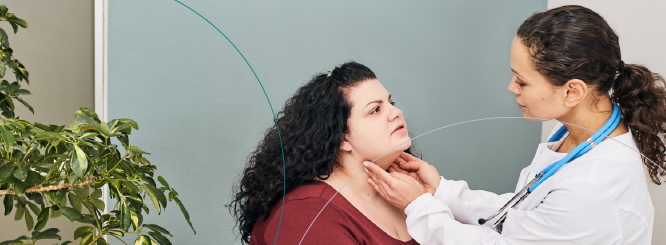
Hypertension or high blood pressure is very common among adults and children, especially in recent years. As you may have noticed from the other articles available on our website, we usually cover how certain diseases or illnesses are directly linked to obesity or being overweight. However, there are other conditions that can affect everyone, regardless of their weight. Hypertension is one of them, as it can be caused by several factors that go beyond the lack of a healthy diet or an active lifestyle.
For this article, we will take a closer and deeper look into hypertension, its causes, symptoms, and available treatments.
The doors of our Tijuana clinic are always open and we receive patients with different backgrounds from both sides of the border. Our multidisciplinary team at LIMARP®, led by Dr. Liza María Pompa González, is here to help you understand the effects of having hypertension, as well as provide all the necessary tools and information to ensure that you lead a healthier lifestyle.
As always, we’d like to remind you that each case is different and the information presented in this article is general. If you haven’t been diagnosed with hypertension, make sure to visit a doctor first before taking any medication or applying drastic changes to your lifestyle. The treatment should be catered to your needs, as its main objective is to help you be healthier and avoid any life-threatening complications.
What Causes High Blood Pressure?
Hypertension, also known as high blood pressure, is a long-term medical condition in which the blood pressure in the arteries is persistently elevated[2]. This condition is usually symptom free, but when hypertension becomes long-term, it is a major risk factor for stroke, coronary artery disease, heart failure, atrial fibrillation, peripheral arterial disease, vision loss, chronic kidney disease, and dementia.
In fact, according to the World Health Organization (WHO), hypertension is a major cause of premature death worldwide[3]. Blood pressure is checked using a cuff, usually placed around the arm and it’s very important that the cuff fits. If it’s too big or too small, blood pressure readings can vary. The cuff is inflated using a small hand pump or a machine. The first time your blood pressure is checked, it should be measured in both arms to see if there’s a difference. After that, the arm with the higher reading should be used.
By definition, blood pressure is the measure of force against the artery walls as the heart pumps blood. There are two different types of readings:
- Systolic: The maximum pressure during a heartbeat.
- Diastolic: The minimum pressure during a heartbeat.
Normal blood pressure is considered 120 (systolic) over 80 (diastolic). Any reading over 140/90 is considered high blood pressure. Blood pressure is a great indicator of overall health because if it’s high, it can lead to heart problems and when it’s too low, it can cause dizziness, fainting, and deprive the body of oxygen, leading to heart and brain damage.
Blood pressure is grouped according to how high it is and this is called staging, which helps guide treatment according to the numbers.
- Stage 1 hypertension: The top number is between 130 and 139 mm Hg or the bottom number is between 80 and 89 mm Hg.
- Stage 2 hypertension: The top number is 140 mm Hg or higher or the bottom number is 90 mm Hg or higher.
Sometimes the bottom blood pressure reading is normal, but the top number is high. This is called isolated systolic hypertension and it’s a common type of high blood pressure in people older than 65.
There are many risk factors for high blood pressure and some of them are manageable [3], such as:
- Smoking
- Processed foods
- Drinking too much alcohol
- Being overweight
- Not exercising
Other risks factors that are not as manageable are:
- Diabetes
- Kidney disease
- Having family with high blood pressure
According to the CDC[4], high blood pressure or hypertension usually develops over time. As we have mentioned, it can happen because of unhealthy lifestyle choices and certain health conditions, such as diabetes and obesity. High blood pressure can also happen during pregnancy. The only way to diagnose if you have hypertension is to visit your doctor so that they’re able to determine if your blood pressure is above average or on the higher side. There are no signs or symptoms that can indicate whether or not you have hypertension, and many patients find out once they go into a doctor’s appointment to address other medical conditions.
It’s important to be aware if you have hypertension or not in order to avoid serious health risks, such as:
- Heart Attack and Heart Disease
Hypertension can damage the arteries by making them less elastic, which decreases the flow of blood and oxygen to the heart, leading to heart disease. Decreased blood flow to the heart can cause chest pains, heart attacks, and heart failure.
- Stroke and Brain Problems
High blood pressure can also cause the arteries that supply blood and oxygen to the brain to burst, causing a stroke. Brain cells die during a stroke because they do not get enough oxygen, causing serious disabilities in speech, movement, and other basic activities. A stroke is also life-threatening.
- Kidney Disease
Adults with diabetes, hypertension, or both have a higher risk of developing chronic kidney disease.
How To Determine the Cause
Once your doctor has diagnosed you with hypertension, they will likely order some tests[5] to pinpoint the cause for the high blood pressure. Some of the tests that they may recommend include:
- Ambulatory monitoring. A longer blood pressure monitoring test may be done to check blood pressure at regular times over the course of 6 or 24 hours. This is called ambulatory blood pressure monitoring.
- Lab tests. Blood and urine tests are done to check for conditions that can cause or worsen hypertension. For example, tests are done to check your cholesterol and blood sugar levels. You may also have lab tests to check your kidney, liver, and thyroid function.
- Electrocardiogram (ECG or EKG). This quick and painless test measures the heart’s electrical activity. It can tell how fast or how slow the heart is beating. During an ECG, sensors called electrodes are attached to the chest and sometimes to the arms or legs. Wires connect the sensors to a machine, which prints or displays results.
- Echocardiogram. This noninvasive exam uses sound waves to create detailed images of the beating heart. It shows how blood moves through the heart and heart valves.
Hypertension Treatment: The Different Options
Changing your lifestyle can help control and manage high blood pressure and as part of your treatment, your doctor may recommend the following changes:
- Eating a healthy diet with less salt
- Regular physical activity
- Maintaining a healthy weight or losing weight
- Limiting alcohol
- Not smoking
- Getting 7 to 9 hours of sleep
It’s important to keep in mind that these lifestyle changes are not always enough and if you don’t notice any changes, your doctor will also recommend other types of treatment to manage your hypertension.
Medication
The type of medicine used for hypertension treatment depends on your overall health and how high your blood pressure is. In some cases, two or more blood pressure drugs often work better than one and it can take some time to find the medicine or combination of medicines that works best for your treatment.
When taking blood pressure medicine as hypertension treatment, it’s important to know your goal blood pressure level. You should aim for a blood pressure treatment goal of less than 130/80 mm Hg if:
- You’re a healthy adult age 65 or older.
- You’re a healthy adult younger than age 65 with a 10% or higher risk of developing cardiovascular disease in the next 10 years.
- You have chronic kidney disease, diabetes, or coronary artery disease.
- The ideal blood pressure goal can vary with age and health conditions, particularly if you’re older than age 65.
So, which medication is recommended for hypertension treatment?
Only your doctor will be able to determine which will work better for you according to your case, but these are some medicines used to treat hypertension:
Water pills or diuretics: These drugs help remove sodium and water from the body and they’re often the first medicines used for hypertension treatment.
There are different classes of diuretics, such as thiazide, loop, and potassium sparing and your doctor will prescribe them depending on your blood pressure measurements and other health conditions, such as kidney disease or heart failure. Diuretics commonly used as hypertension treatment include chlorthalidone, hydrochlorothiazide, and others.
There are several side effects to this type of hypertension treatment, such as increased urination, which can reduce potassium levels. A good balance of potassium is necessary to help the heart beat correctly and if you have low potassium, your doctor may prescribe a potassium-sparing diuretic that contains triamterene as part of your hypertension treatment.
- Angiotensin-converting enzyme (ACE) inhibitors: These drugs help relax blood vessels and block the formation of a natural chemical that narrows blood vessels. Some of the examples used for hypertension treatment include lisinopril, benazepril, captopril, and others.
- Angiotensin II receptor blockers (ARBs): These drugs also relax blood vessels, but they block the action, not the formation, of a natural chemical that narrows blood vessels. ARBs for hypertension treatment include candesartan, losartan, and others.
- Calcium channel blockers: These drugs help relax the muscles of the blood vessels as part of hypertension treatment. They include amlodipine, diltiazem, and others.
It’s recommended that the patient doesn’t eat or drink grapefruit products when taking calcium channel blockers because they increase blood levels, which can be dangerous. If you’re undergoing hypertension treatment, contact your doctor or a dietitian to make sure that your diet doesn’t interfere with your treatment.
Are there any other types of medication to treat hypertension?
Yes. If you’re having trouble reaching your blood pressure goal with the medicine that was mentioned above, your doctor may recommend other types of medication for your hypertension treatment. Here are some examples:
- Alpha blockers: These medicines reduce nerve signals to blood vessels and help lower the effects of natural chemicals that narrow blood vessels. Alpha blockers include doxazosin, prazosin, and others.
- Alpha-beta blockers: These blockers block nerve signals to blood vessels and slow the heartbeat, reducing the amount of blood that must be pumped through the vessels. Alpha-beta blockers include carvedilol and labetalol.
- Beta blockers: These blockers reduce the workload on the heart and widen the blood vessels, making the heart beat slower and with less force. Beta blockers for hypertension treatment include atenolol, metoprolol, and others. Beta blockers aren’t usually recommended by themselves, as they may work best when combined with other blood pressure drugs.
- Aldosterone antagonists: These drugs may be used as treatment for resistant hypertension. They block the effect of a natural chemical that can lead to salt and fluid buildup in the body. Some examples are spironolactone and eplerenone.
- Vasodilators: These medicines stop the muscles in the artery walls from tightening and prevent the arteries from narrowing. Examples include hydralazine and minoxidil.
- Central-acting agents: These medicines prevent the brain from telling the nervous system to increase the heart rate and narrow the blood vessels. Some examples include clonidine, guanfacine, and methyldopa.
Always take blood pressure medicines as prescribed for your hypertension treatment. It’s important to follow your doctor’s recommendations, which means never skipping a dose or abruptly stop taking blood pressure medicines unless told otherwise. Suddenly stopping certain ones, such as beta blockers, can cause a sharp increase in blood pressure called rebound hypertension.
Resistant Hypertension and its Treatment:
Here are some points that can indicate if you have resistant hypertension:
- You take at least three different blood pressure drugs, including a diuretic, but your blood pressure remains high.
- You’re taking four different medicines to control high blood pressure.
Keep in mind that having resistant hypertension doesn’t mean your blood pressure will never get lower, it just means that a more effective treatment plan can be created to help you manage your hypertension.
In order to treat resistant hypertension, your doctor may recommend the following:
- Changing blood pressure medicines to find the best combination and dosage.
- Reviewing all your medicines, including those bought without a prescription.
- Checking blood pressure at home to see if medical appointments cause high blood pressure, known as white coat hypertension.
- Eating healthy, managing weight, and making other lifestyle changes.
Potential Future Treatments for Hypertension
Medical researchers have been studying the use of heat to destroy specific nerves in the kidney that may play a role in resistant hypertension and this method is called renal denervation. The early showings have been positive, but as is the case with all medical research, there needs to be more studies in order to ensure the effectiveness and safety of this type of treatment for hypertension.
Contact Us to Learn More
If you want more information about a treatment for hypertension, schedule an appointment with one of our doctors. We can help determine the right treatment for you. Contact us online anytime or give us a call at (619) 373-0229.
References
[1] “Managing high blood pressure”. https://www.heartfoundation.org.nz/. (Accessed February 20, 2023).
[2] Naish J, Court DS (2014). Medical sciences (2 ed.). p. 562. ISBN 9780702052491.
[3] “Hypertension”. https://www.who.int/news-room/fact-sheets/detail/hypertension. (Accessed February 20, 2023).
[4] “High Blood Pressure Symptoms and Causes”. https://www.cdc.gov/bloodpressure. (Accessed February 20, 2023).
[5] “Hypertension: Diagnosis”. https://www.mayoclinic.org/diseases-conditions/high-blood-pressure/diagnosis-treatment/drc-20373417. (Accessed February 20, 2023).


